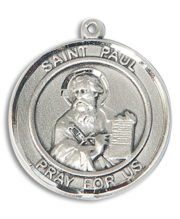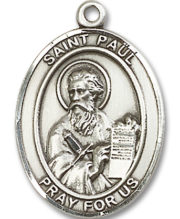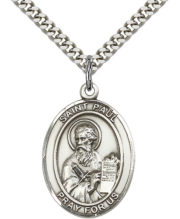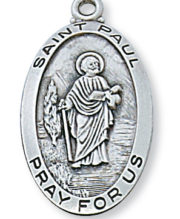Saints
St. Paul Spreads Christianity to the World
St. Paul
Saint Paul was one of the most extraordinary men who ever lived. Physically he was small; mentally and spiritually he was a giant. For St. Paul there were no such things as half measures or selfish considerations. Early in his life he threw all of his tremendous energy into an attempt to wipe out Christ’s Church. Later, he used that same great energy in behalf of the Church. He reached such a pinnacle of spirituality that he could say: “I live now not I, but Christ lives in me.”
A Prosecutor of Christians
The man who was to become the Apostle of the Gentiles was a Jew of the tribe of Benjamin. At his circumcision on the eighth day after his birth he was given the honored Jewish name of Saul. His home was the city of Tarsus and he was a Roman citizen. His fervent Jewish parents trained him at home and then sent him to Jerusalem to be instructed in the Law of Moses. He joined the Pharisees who were the strictest of all Jews in observing the letter of the law.
When his schooling was completed Saul went back to Tarsus. He was there while our Lord was preaching and teaching in and around Jerusalem. Saul never met Jesus. Sometime after our Lord had ascended into heaven, Paul was back in Jerusalem. Being a dedicated Pharisee, he was enraged by the new Church which had sprung up in Jerusalem and the surrounding rounding country.
These people who called themselves Christians were departing from Jewish laws and traditions! He felt that this cause Church must be wiped out, and he felt that he was serving God when he tried to wipe it out. He was one of those who were present when St. Stephen the first martyr, was stoned to death. Saul himself did not throw a stone but he looked after the garments of those who did the throwing, and he thoroughly approved of the killing.
Stephen prayed for his persecutors as he died. “If Stephen had not prayed,” says St. Augustine, “the Church would never have had St. Paul.” Soon after this Saul obtained the permission of the high priests to go to Damascus, arrest all Christians there, and bring them back in chains to Jerusalem. As Saul and his party approached the city about noon, a dazzling light enveloped him and he fell to the ground. All those who were with him saw the bright light which surrounded their leader.
Accepting the Call from the Lord
Then Saul heard a voice which was not heard by the others: “Saul, Saul, why dost thou persecute me?” Saul said: “Who art thou, Lord?” “I am Jesus whom thou persecuted.”
“Lord, what wilt thou have me do?” Christ told Saul to go into Damascus and wait. When Saul rose from the ground he found that he could not see. He was led into Damascus and was taken to the home of a man named Judas where he waited for three days.
Our Lord appeared to a disciple named Ananias who lived in Damascus. He told Ananias to go to Saul. Ananias trembled at the thought because he knew why Saul had come to Damascus. But our Lord overruled the fears of Ananias and gave him his instructions.
Ananias went to Saul, and said: “Brother Saul, regain thy sight.” Immediately Saul’s sight returned. Ananias told Saul that God had singled him out for special work and told him to go and be baptized. Saul did so, taking the name Paul. Then to the complete astonishment of everyone, he preached in the synagogue that Jesus is the Son of God.
Rejected by both Christians and Jews
 Paul’s first preachings were not well received. The Jews looked upon him as a traitor, and the Christians were suspicious of the man had been their bitter enemy. Partly because of this treatment, e mostly to draw closer to God, Paul retired into the desert of Arabia to pray and do penance. After his sojourn in the desert Paul returned to Damascus to preach in the synagogue. Fury against him was so great that he had to flee the city, being let down outside the city wall in a basket.
Paul’s first preachings were not well received. The Jews looked upon him as a traitor, and the Christians were suspicious of the man had been their bitter enemy. Partly because of this treatment, e mostly to draw closer to God, Paul retired into the desert of Arabia to pray and do penance. After his sojourn in the desert Paul returned to Damascus to preach in the synagogue. Fury against him was so great that he had to flee the city, being let down outside the city wall in a basket.
He went to Jerusalem but the resentment against him was so strong that he left there, too. Next he went to his native city of Tarsus and then to Antioch, in Syria, where he made many converts. Until this time, the new Christian Church had seemed to be entirely a Jewish affair. Jews had been its first converts, and Jews had been its fiercest persecutors.
People in other parts of the Roman Empire looked upon Christianity as a sect that was growing up among the Jews. But when Paul went to Antioch, most of his converts were Gentiles, or non-Jews. The Church had broken the bands that confined it to a small group of Jewish people.
Bringing the Word of God to ALL People
The Church had begun the growth that would eventually take it into every part of the world. The famous disagreement between the Apostles concerned the treatment of Gentile converts, with Paul on the side of the Gentiles. St. Peter was inclined to be conservative in his attitude toward Jewish customs. He did not wish to scandalize the Jewish converts and so he would not eat with certain Christians who did not conform to old Jewish rules regarding food. Paul told Peter that he was mistaken and was doing more harm than good. Paul argued that the old Mosaic law was dead and had been superseded by the law of Christ. In the end, Peter came around to Paul’s point of view.
Gradually Paul was accepted by the Apostles. He proved to be a tireless laborer for the Gospel. He was a forceful and convincing speaker. It would be impossible in a short account such as this to tell the stories of his missionary journeys in detail. He traveled thousands of miles throughout Asia and Europe. Everywhere that he went he left behind him Christian congregations and priests to minister to them.
As he traveled on his missionary journeys Paul might have lived on the contributions of his converts, but he did not wish to be a burden to others. Everywhere he went he supported himself through his trade of tent making, which he had learned from his father.
The Epistles of St. Paul
As Paul traveled from one place to another he kept in touch to the congregations which he had founded, encouraging them, and giving them further instructions. He did this through his famous Epistles, fourteen of which are included in the New Testament. Ten of these were written to congregations, three were addressed to pastors, and one was largely personal.
This one concerned a runaway slave whom Paul had met, converted, and sent back to his master, Philemon. Paul asked the master to receive the slave as a brother most dear … welcome him as thou wouldst me. And if he did thee any injury or owes thee anything, charge it to me…. I am writing to thee, knowing that thou wilt do even beyond what I say.”
Martyrdom of St. Paul
About A.D. 56 Paul was arrested in Jerusalem. He was later transferred to a prison in Caesarea, where he was held for two years although there was no real evidence against him. As a Roman citizen, he demanded that his case be heard by the emperor, so it was decided that he should be sent to Rome. The ship was wrecked in a storm, but the passengers managed to reach the island of Malta.
After a delay of three months, Paul went to Rome where he was kept in prison for some time and then dismissed. His last great missionary journey took him to Spain. When he returned to Rome, he was arrested and was beheaded during the persecution of Nero, It is commonly said that he died on the same day as St. Peter, but this is not certain. He was executed on the Ostian Way near the place where the basilica of St. Paul Outside the Wall stands today.
Shortly before he died, Paul wrote: “I am even now ready to be sacrificed, and the time of my dissolution is at hand. I have fought a good fight; I have finished my course; I have kept the faith. A for the rest, there is laid up for me a crown of justice which the Lord, the just judge, will render to me in that day, and not only to me, but to them also that love his coming.”
Prayers to St. Paul the Apostle
St. Paul, great Apostle of the Gentiles,
intercede for us to God.You are God’s special vessel of election.
Through your intercession
we hope to receive from Him this special grace:(State your prayer intention)
God, you have instructed many nations
through the preaching of the Apostle Paul.Let the power of his intercession with You help us
who venerate his memory this day. Amen.
O glorious Saint Paul, who, from being a persecutor of the Christian name, didst become its most zealous Apostle, and who, to carry the knowledge of Jesus, our divine Savior, to the uttermost parts of the earth, didst joyfully suffer prison, scourgings, stonings, shipwreck and all manner of persecutions, and who didst finish thy course by shedding the last drop of thy blood: obtain for us the grace to accept, as favors bestowed by the mercy of God, the infirmities, sufferings and misfortunes of this life, that we may not grow slack in our service of God by reason of these vicissitudes of our exile, but that we may rather show ourselves ever more devoted. Amen.
O Glorious Saint Paul,
after persecuting the Church
you became by God’s grace its most zealous Apostle.To carry the knowledge of Jesus, our Divine Savior,
to the uttermost parts of the earth you joyfully endured prison,
scourgings, stonings, and shipwreck,
as well as all manner of persecutions
culminating in the shedding of the last drop of your blood
for our Lord Jesus Christ.Obtain for our priests the grace to labor strenuously
to bring the faith to others
and to accept any trials and tribulations that may come their way.Help them to be inspired by your Epistles
and to partake of your indomitable love for Jesus,
so that after they have finished their course
they may join you in praising him in heaven for all eternity. Amen.









